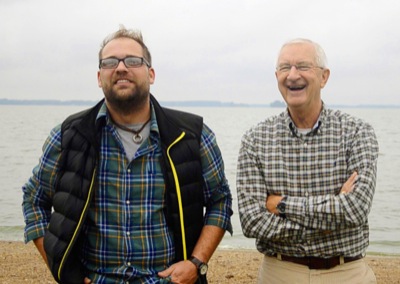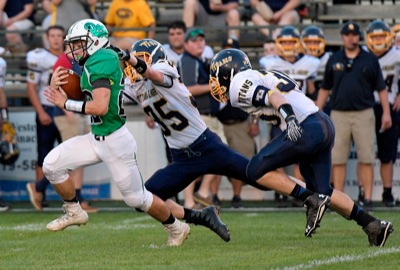Saturday, September 23rd, 2017
A fish that everyone carps about
Reviled species here to stay in Grand Lake
By Aaron Snyder

Photo by Aaron Snyder/The Daily Standard
Wright State University-Lake Campus Associate Professor of Biology Stephen Jacquemin, left, and Tom Knapke, Lake Restoration Commission coordinator, stand on the shore of Grand Lake. After Jacquemin and his team spent months researching how many carp are in Grand Lake, where they are and what it would cost to remove them, they have concluded that the lake is too large to remove them all. An interview with Jacquemin and Knapke is online.
Peanut butter and jelly, peas and carrots, carp and Grand Lake - some things are just meant to be together.
"It (the carp population) has been here since the beginning of Grand Lake" said Stephen Jacquemin, a Wright State University-Lake Campus associate professor of biology.
The common carp, part of the minnow family, was brought to North America from Europe as an algae-control measure and food source.
As part of the Lake Restoration Commission's 2011 Strategic plan, officials planned to study the feasibility of removing the fish and what the effects of that removal would be. This first phase is now complete.
"What we found is an unbelievably high density of common carp in Grand Lake" said Jacquemin, who led the local study.
LRC Coordinator Tom Knapke noted the study showed the carp localizing.
"According to what Stephen has found so far, most of them are on the southwest corner," he said
The bottom-feeding fish were tracked using radio-frequency transmitters surgically implanted into 25 carp in the spring of 2016. Jacquemin and his team pinged the fish three times to locate them. Their locations were logged many times throughout the study. A year and a half later, all 25 fish are still alive and active.
The study concluded that the carp were in Grand Lake to stay.
"Consulting with other people around the country on this issue has really led us to this understanding that a system like Grand Lake is simply too large, with too many tributaries, to effectively rid it of the common carp" Jacquemin said. "That's sort of the reality. This systems is far too large to effectively get rid of every single common carp. And because of their capacity to reproduce, if you leave some percentage, even a small percentage, and you stop (removal) activity, they come right back."
"They are in every single place that's wet," Jacquemin continued. "They're in the areas that sometimes connect to the lake when it spills over during high pool. They're absolutely everywhere and this is why a physical removal system is just not something for a lake this size and shape and configuration. Even if you could get them out of the entire lake, they will come right back from the tributaries. Even if you could get them out from the tributaries and the lake, they'll come in from a side habitat."
Carp are not a traditional sport fish, and they hurt the water quality for sport fish.
"Common carp are a negative thing for native North American freshwater ecosystems because they are able to outcompete a lot of other native fish for food stock, for space, and they grow quickly," Jacquemin said.
In their search for food and habitat, carp root around in the lake bottom, stirring up the sediments rich in phosphorus and nitrogen. These chemicals are the food for the blue-green algae that creates toxic blooms in the lake.
Attempts to catch the carp using large nets proved to be futile.
"The issue with the total removal of the carp from Grand Lake is that the lake is laden with stumps and other debris as we all know," Knapke said. "They tried netting at one time, but the netting was broken because it caught on stumps."
The carp derby to remove the fish will continue, but more activities are needed to reduce carp numbers.
The carp eat a large variety of foods and can thrive in many different habitats making it difficult to cut their population.
Jacquemin suggests improved water quality may reduce the carp population.
"As the water improves, other water taxa (types of animals) can possibly compete with the carp" Jacquemin said.
Improving the water quality both chemically and physically should increase the native fish population.
"The more quality native fish you have, the less room you have for those carp," Jacquemin said.





